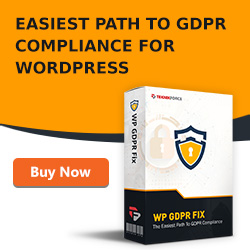WordPress Security Plugins – The 3 WordPress Security Barriers

 Do you know the three biggest WordPress security barriers that frustrate most WordPress website owners? Are you aware that you can resolve a number of these just with WordPress security plugins?
Do you know the three biggest WordPress security barriers that frustrate most WordPress website owners? Are you aware that you can resolve a number of these just with WordPress security plugins?
If you're a WordPress website owner who wants to avoid security barriers and take practical steps to make your site hacker-proof, then read this article immediately.
Barrier No.1: I Don't Know If I Have a Problem!
Let’s deal with the most fundamental problem first. Many people suspect that they might have a problem with security but don’t realise the scale of the problem. They don’t know if they are a likely target for hackers or not. They don’t know whether or not their site is already under attack.
Why is it a Barrier?
Ignorance is not bliss. Turning a blind eye to a prevalent problem will not make it go away. Pretending it’s not a problem will not help. Hacking is one of the biggest and most costly problems out there for a website owner. It's vital you take action today to safeguard your site tomorrow. And that starts with discovering whether or not you have a problem.
What is the Real Problem Here?
The reality is that if you have a WordPress site, and especially if it gets a fair amount of traffic, that it may well already be under attack! In fact it's more than likely you site's under attack. You just can’t see it.
I see the results of hacking attacks every day. If you saw what I see, you'd realise the need for urgent action!
How Do You Get Around This?
You need to know a little about WordPress security plugins. You can get around this lack of knowledge simply by installing a free (yes, free!) security plugin.There's one I recommend to all my clients as a first line of defence. It's called WordFence.
Go to your WordPress Dashboard and search for the (free) WordFence plugin. You will need to configure this plugin to change some of the default options. But once you do, you’ll see the scale of the hacking activity that threatens your website.
For example, you’ll be notified about login attempts where hackers attempt to guess your WordPress username and password. This alone is worth getting this plugin for. If you're a bit overwhelmed by the options, just contact me and I can help you.
Barrier No.2: I Don't Know Where To Start
The next barrier I see is people who really don’t know where to start with security issues. Let’s say they have identified there are regular and persistent attempts by hackers to guess their WordPress administrator username and password.
Why Is It a Barrier?
It should be obvious this is a problem that needs to be resolved, but many people don’t know where to start. Again we need to start with objective facts. Your new WordFence plugin will give you loads of information if you let it. But security is not just about installing WordPress security plugins.
How Do You Get Around This Barrier?
After you’ve become aware of the hacking threats that face you by installing WordFence, you can start to configure it to meet your needs. The WordFence plugin will help you here by pointing to your likely security vulnerabilities.
Let’s say, for example, you have left the WordPress administrator username at the default value: ‘admin’. This is the most hacked username, as hackers realise that they can make their lives easier by hacking sites that leave their username as ‘admin’.
With WordFence, you’ll be able to see just how many hackers are trying to gain illicit access to your site in this way every day! You can see if hackers are trying 'admin' as a username. You'd be amazed how many do. This can be frightening and sobering, but there is a solution.
You Get Around This By ...
The way to get around this barrier is straightforward. Set up a new administrator user with a username other than ‘admin’. And give it a secure password – WordPress will do this for you. Now delete the 'admin' username so it can no longer be used.
If both your administrator username and your password are hard to guess, this is likely to block all but the most persistent hackers.
Barrier No.3: I Don't Know What to do After I'm Hacked
Why Is It a Barrier?
It’s best to know the route to sort out a problem before you come across it. That way you don’t waste time and potentially make costly errors.
If you don't know what to do when you’re hacked it can also mean your website is offline for longer than it needs to be. In the worst case, not knowing what to do could mean the loss of your site!
How Do You Get Around This Barrier?
You get around this by initially approaching your hoster. If they’re professional, they will have a service to clean up your site. This may either be included in your hosting fees, or may be an extra charge. Either way it may be cheaper than going to a specialist.
Failing that, there are a number of professional service providers who specialise in WordPress website cleanup. I use SiteLock and WordFence, and some of my clients use Sucuri. There are others out there, but I’d recommend checking out these providers first.
The service you’ll require depends on the nature of the hack, but if you know what cleanup is likely to cost beforehand and where to go, you’re in a much better position.
WordPress Security Plugins
WordPress security is a big and complex topic and can be a bit overwhelming to the uninitiated. There are many services available - and a lot of them are costly. The whole area can be a minefield! If this article has whetted your appetite to discover more about WordPress security plugins and what they can do for you, read on ...
Taking This Further …
Now you know the top three WordPress security barriers website owners face and how to bypass them. So I'd like to invite you to cut to the front of the line to discover what further steps you can take to increase your security of your WordPress site.
As there's more information here than I can cover in a short article, I've put together an free online training to help you. So if you want to make your website secure - so that it doesn’t get hacked - join me on this FREE online training.
This could be the first step in making your site hacker-proof! Click on the link now.
FREE WordPress Plugin Online Training


FREE WordPress Plugin Online Training
Discover the essential plugins for your WordPress site - plugins to improve your security and plugins to increase the speed of your site.
This FREE WordPress plugin online training shows you which plugins to choose, where to get them and how to install them.
Protect your site and speed it up now!
Get IMMEDIATE access to your FREE online training: click here now.
Advanced WordPress Security Plugin Tips You Need To Know

 Do you want to know the three advanced WordPress security plugin tips every WordPress website owner should know to make your website secure? If you're a WordPress website owner who wants advanced tips on how to make your website secure so that it doesn't get hacked and you lose access to it, then read this article to take your WordPress security plugins knowledge to the next level.
Do you want to know the three advanced WordPress security plugin tips every WordPress website owner should know to make your website secure? If you're a WordPress website owner who wants advanced tips on how to make your website secure so that it doesn't get hacked and you lose access to it, then read this article to take your WordPress security plugins knowledge to the next level.
Advanced WordPress Security Plugin Tips No.1: Know What TYPE of Security-Enhancing Service You Need
What Is The Tip?
It's essential that you understand what type of security service you need. There are many on the market ranging from free to really quite expensive.
Why Is This Important?
All security-enhancing services are not the same! Some are based around simple free plugins with limited functionality. Others include a raft of scanning, updating and cleanup software. You have to understand exactly what services you need, otherwise you'll end up paying over the odds for services you don't need.
To help you out, ask yourself a few questions to put this tip to work for you.
- Have you already been hacked, or suspect you might?
- Do you need constant monitoring and repair against hackers attacking your site?
- Do you need to block hackers from trying to log into your WordPress backend?
- What's the best way to use this information to get better WordPress security?
Advanced WordPress Security Plugin Tips No.2: What Budget Should You Have For WordPress Security?
The answer to this question is not 'none'. You'll either need to pay with your time or with hard cash to get the level of protection you need.
To get an idea of how much you need to pay, answer these questions:
- Is your website a revenue generating site or just a lifestyle enhancing site?
- Must your site be up 100% of the time, and if not, what downtime can you tolerate?
- Now what is your budget for website security?
- If you're still stuck, imagine your website is taken offline by hackers.
- What will it cost to reinstate it from scratch? Several hundred Pounds? Several thousand?
- How much would losing your website cost you in lost business?
- How much business will you lose while it's offline?
Why Is It Important?
This tip is priceless because you can now determine what budget you should be allocating to security. This makes it much easier to select suppliers.
Once you know what type of protection you need and what you'll need to pay, you can review the offerings from the major vendors like Sucuri, WordFence, All-in-One Security and others.
How Do You Implement This Tip?
So how do you implement this tip to get the result you need in terms of better WordPress security?
Once you know what your business impact of a lost site is, it should be quite straightforward to set a security budget that will guard against this.
For example, let's say your site cost £1,200 to build and brings in £500 per month in client business. That's £6,000 per year. You should certainly be prepared to have a budget of a few hundred pounds per year to ensure you don't get hacked, and can get back online quickly.
Advanced WordPress Security Plugin Tips No.3: Know What Security Options You Have Open To You
This is where you need to do some research. Based on your answers to the two questions above, do you require a comprehensive suite of security services that will rapidly and automatically restore your site to the last-known valid state? Do you require a simple login blocking plugin? Do you need something in between?
Do you need malware cleanup, and how quickly does this need to happen? Your hoster MAY perform malware cleanup, but their implementation timescales may be a week or longer. Can you afford to be offline for that long?
Which Security Services, If Any, Have You Available To You Right Now?
This may be 'none', but you may have some basic security features included with your hosting. It’s best to check this out, to avoid paying out for services you already have.
Why Is This important?
Once you know what your options are and know what your budget should be, you can begin to shortlist suppliers.
And once you've made your decision and paid your money, you can relax knowing your WordPress site is well protected!
How You Can Find Out More ...
Now that you've got the advanced WordPress security plugin tips success down, I'd like to invite you to get even MORE advanced help with your free, instant access to my "Essential WordPress Plugins Online Training."
If you're a WordPress website owner who wants to make your website secure so that your site will not get hacked and you lose access to it then my "Essential WordPress Plugins Online Training" will give you the information you need.
Click Here For More: http://alunloves.it/plugins
WordPress Security Plugin Mistakes – And How To Avoid Them

 Do you know the three biggest WordPress security plugin mistakes owners make that leave their websites wide open to attack by hackers? If you want to make your website secure and avoid the WordPress security plugin mistakes that stop most people dead in their tracks read this immediately because the killer mistakes and what to do instead are inside this article.
Do you know the three biggest WordPress security plugin mistakes owners make that leave their websites wide open to attack by hackers? If you want to make your website secure and avoid the WordPress security plugin mistakes that stop most people dead in their tracks read this immediately because the killer mistakes and what to do instead are inside this article.
Mistake No.1: Not Keeping Your Plugins and Themes up to Date
What is the mistake?
The mistake here is simply not keeping your plugins and themes updated to the latest level. The same also applies to keeping your WordPress version up to date.
Why is it a mistake?
This is a huge mistake because you're not benefiting from the corrections that developers continually make to fix the security holes they discover in their code. And any vulnerabilities with WordPress, popular themes or plugins are quickly exploited by hackers.
What should you do instead?
Instead of leaving your plugins, themes and WordPress versions on old versions, simply update them when new versions are released. It's as simple as that. These days, most plugins, themes and the WordPress base code will prompt you to update them to the latest level when a new version is released. It's just a question of clicking on 'Update' in your WordPress Dashboard.
Mistake No.2: Not Creating Secure Passwords
What is the mistake?
The mistakes here are to first of all use 'Admin' as the administrator username and something like 'password' or 'test1234' as your password. This is just asking for trouble.
Why is it a mistake?
This is a mistake as the default username 'Admin' is consistently the most common username used by hackers to attack your site. They know that so many people do not change the default username, and so they already are 50% of the way into hacking your site. They now only need your password.
What should you do instead?
Instead of creating insecure usernames and passwords, you should always use a hard to guess administrator username and a secure password. Having a secure password is easy, as WordPress itself will generate one for you.
Now you just need a utility like LastPass or Roboform to store all your passwords securely so you don't forget them.
Mistake No.3: Not Using a Plugin That Stops Brute-force Attacks
What is the mistake?
The mistake here is to not select a security plugin that has a function that detects and blocks brute-force attacks. These are attacks where many tens (or hundreds) of passwords are attempted by the hacker in rapid succession.
Why is it a mistake?
Brute-force attacks are the most common type of hack that to which your website can be vulnerable. And they are fairly easy to prevent if you have the right tools.
What should you do instead?
Use a security plugin that stops brute-force attacks by locking out a user if they incorrectly attempt to login more than a set number of times. You may decide to set this limit at 10 failed logins. If you do, a hacker will be locked out and unable to access your site for a period of time.
Don't set this tool low, as if you get your password wrong 10 times (in this example), you too will be locked out! Although better security plugins will allow you to whitelist your own IP address.
Summary of WordPress Security Plugin Mistakes
Now that you know the top three WordPress security plugin mistakes and how to avoid them, I'd like to invite you to take your next success steps with free instant access to my "Essential WordPress Plugins Online Training."
If you're a WordPress site owner who wants to make your site hacker-proof then my "Essential WordPress Plugins Online Training" will help you to both speed your site AND make it secure!
Click Here For More: http://alunloves.it/plugins
Free Essential WordPress Plugins Online Training

 Free Essential WordPress Plugins Online Training
Free Essential WordPress Plugins Online Training
So many WordPress plugins have been released in the last year it's hard to keep up. There are now over 44,000 plugins on the WordPress plugin directory alone! But the thing is, many are now essential to your site.
But which ones are essential? And how do you know?
Let's start with two classes of essential plugin: ones to make your site more secure, and ones to speed up the loading speed of slow sites.
But which plugins should you chose and why? You can end up in a much bigger mess than when you started out!
Ask Yourself:
- Do you know how to protect your site?
- And what you should protect against - and how?
- Do you know which plugins make your site run faster?
- Which ones actually make a difference?
- And how would you know whether they make a difference?
Preventing your site from being hacked should be your number one concern. There is a huge number of WordPress sites being hacked currently. Forbes reported Sophos Labs as saying it's 30,000 sites A DAY!
The question is, do you have to have special secure hosting, and premium, paid security plugins? Do you need to spend a fortune on a webmaster? Do you need a security consultant on retainer?
I suggest your first step is to watch this online training I've prepared for you. That way you can decide what's right for you.
Essential WordPress Plugins Online Training
On this free online training, I'll show you two things:
- How to secure your WordPress site, so that you are unlikely to be hacked.
- How to speed up your WordPress site - and know how much faster it is!
I'll show you the plugins that make a difference, and how to install them.
Reserve Now
My FREE online training is available now.
Click on the graphic or the link below to reserve your seat.
ps grab this now, while it's still available - I don't know how long it will be up, but when it's gone, it's gone!





